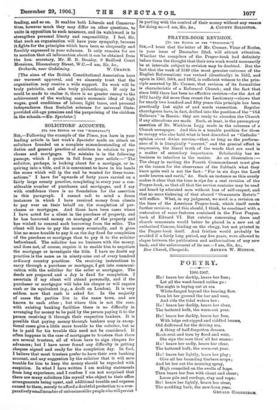SOLICITORS' ACCOUNTS.
[TO TOR EDITOR OF sesorirea.*1 SIR,—Following the example of the Times, you have in your leading article in last week's Spectator made an attack on solicitors founded on a complete misunderstanding of the duties and general practice of solicitors in relation to pur- chases and mortgages. The mistake is in the following passage, which I quote in full from your article:—" The solicitor, perhaps, is looking about for a mortgage, or in- quiring into a title, and it is convenient to leave in his hands the sums which will in the end be wanted for these trans- actions." I have for upwards of forty years carried on a fairly large county practice, completing in every year a con- siderable number of purchases and mortgages, and I say with confidence there is no foundation for the assertion in this paragraph. I cannot call to mind a dozen instances in which I have received money from clients to pay over on their behalf on the completion of pur- chases or mortgages. And those have been cases where I have acted for a client in the purchase of property, and he has borrowed money on mortgage of the property and has wished to conceal such borrowing from the seller. The client will have to pay the, money eventually, and it gives him no more trouble to pay it on the day fixed for completion of the purchase or mortgage than to pay it to the solicitor beforehand. The solicitor has no business with the money, and does not, of course, require it to enable him to negotiate the mortgage or investigate the title. I have no doubt my practice is the same as in ninety-nine out of every hundred ordinary country practices. On receiving instructions to carry through a purchase or mortgage, I get into communi- cation with the solicitor for the seller or mortgagor. The deeds are prepared and a day is fixed for completion. I ascertain if my client will attend personally, and if the purchaser or mortgagor will take his cheque or will require cash or its equivalent (e.g., a draft on London). It is very seldom now that cash is asked for. In the majority of cases the parties live in the same town, and are known to each other ; but where this is not the case, with existing banking facilities there is no difficulty in arranging for money to be paid by the person paying it to the person receiving it through their respective bankers. It is possible that paying money through bankers may in excep- tional cages give a little more trouble to the solicitor, but as he is paid for his trouble this need not be considered. It often happens in the case of mortgages to trustees that there are several trustees, all of whom have to sign cheques for advances; but I have never found any difficulty in getting cheques signed and ready for the completion day. In fact, I believe that most trustees prefer to have their own banking account, and any suggestion by the solicitor that it will save trouble for him to keep the money should be regarded with suspicion. In what I have written I am making statements from long experience, and I confess I am not surprised that there are many solicitorslike myself who object to their office arrangements being upset, and additional trouble and expense caused to them, merely to afford a doubtful protection to a corn- parativelysmall number of unbusiuesslike people who will persist in parting with the control of their money without any reason


































 Previous page
Previous page